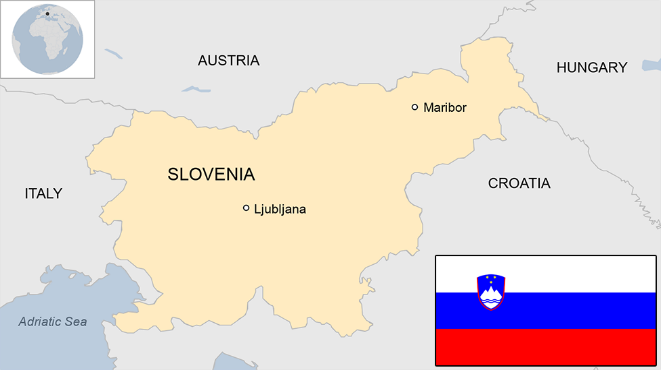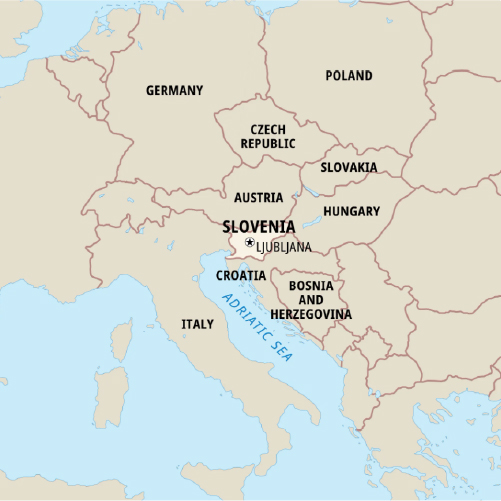Slovenia

- 06 Aug 2025
In News:
Slovenia has announced a complete ban on the import, export, and transit of weapons to and from Israel in response to Israel’s military actions in Gaza. This makes it the first European Union (EU) member state to enforce a blanket arms embargo on Israel.
Context and Diplomatic Stand
- Slovenia has frequently criticized Israel for alleged atrocities in Gaza.
- In June 2024, Slovenia’s parliament recognisedPalestinian statehood, joining Ireland, Norway, and Spain.
- In July 2024, it barred two far-right Israeli ministers from entering the country, citing “incitement of violence” and “genocidal statements.”
- Although Slovenia’s arms trade with Israel is minimal, the decision carries symbolic diplomatic weight, intended to pressure Israel amid growing international condemnation.
Other European countries have taken partial measures:
- UK (2024): Suspended export of some weapons that could breach international law.
- Spain (2023): Halted arms sales.
- Netherlands, France, Belgium: Tightened regulations or faced legal challenges, but none imposed a total embargo like Slovenia.
Slovenian Prime Minister Robert Golob emphasized that Slovenia would act unilaterally in the absence of collective EU action, accusing the EU of disunity in addressing the humanitarian crisis in Gaza.
About Slovenia
- Location: Central Europe; formerly part of Yugoslavia.
- Capital: Ljubljana.
- Borders: Austria, Hungary, Croatia, Italy; coastline along the Adriatic Sea (Gulf of Venice).
- Memberships: Joined EU and NATO in 2004; uses the Euro.
- Physical Features:
- Alpine Highlands (~40% of territory) – includes Julian Alps, Karavanke, Kamnik-Savinja Alps. Highest peak: Mount Triglav (2,864 m).
- Karst Plateau – globally renowned for caves, sinkholes, underground rivers.
- Subpannonian Plains – fertile alluvial soils; rivers Sava, Drava, Mura drain toward the Danube.
- Slovene Littoral – 47 km coastline; major port Koper.
India and Slovenia Announce Five-Year Collaboration Plan

- 06 Dec 2024
In News:
India and Slovenia have announced a five-year scientific collaboration plan (2024-2029) to deepen ties in research and technology. The Programme of Cooperation (PoC) was finalized during a meeting between Dr. Jitendra Singh (Indian Minister for Science and Technology) and Dr. Igor Papi? (Slovenian Minister for Higher Education, Science, and Innovation) on December 5, 2024.
Key Highlights:
- Joint Research Focus: The collaboration will focus on hydrogen technologies, sustainable innovation, AI, renewable energy, and smart cities.
- Over 20 Successful Projects: More than 20 joint initiatives in sectors like health, AI, and energy have already been implemented.
- Future Areas of Collaboration: New research projects will be launched, further strengthening academic exchanges and scientific networks between the countries.
- Hydrogen Technologies: Both ministers emphasized hydrogen's role in global energy sustainability, marking it as a critical area for future research.
- Historical Partnership: This builds on a partnership dating back to a 1995 agreement, with initiatives like the Joint Working Group on Scientific and Technological Cooperation.
What is the Programme of Cooperation (PoC)?
- The Programme of Cooperation (PoC) is a formal agreement between two countries designed to enhance collaboration in specific sectors, such as science, technology, and innovation.
- In the case of India and Slovenia, the PoC for the period 2024–2029 aims to promote joint research efforts, academic exchanges, and partnerships in emerging fields like hydrogen technologies, sustainable innovation, and other transformative areas.
- The PoC serves as a structured framework for long-term cooperation, enabling both nations to develop networks among scientists and researchers while addressing global challenges through collaborative innovation.
